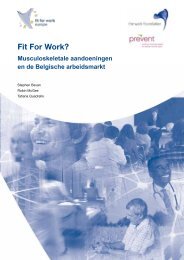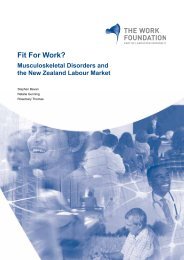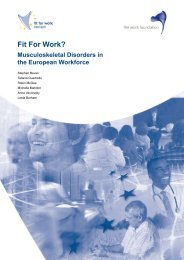FfW Bulgarian report (English language) - Fit for Work Europe
FfW Bulgarian report (English language) - Fit for Work Europe
FfW Bulgarian report (English language) - Fit for Work Europe
Create successful ePaper yourself
Turn your PDF publications into a flip-book with our unique Google optimized e-Paper software.
5.2<br />
Recommendations<br />
<strong>for</strong> employees<br />
Conclusions and recommendations<br />
64<br />
• Provide your employees with meaningful and fulfilling jobs. Even people with temporary<br />
or permanent incapacity are still capable of per<strong>for</strong>ming work, where they can apply their<br />
preserved skills and abilities.<br />
• Train line managers to be supportive. Line managers are best placed within<br />
an organisation to take early action when someone shows signs of physical or<br />
psychological strain. Encourage managers to be open in their approach and be aware<br />
of what steps they can take to reduce risks – both physical and psychological to their<br />
employees.<br />
• Engender a culture of wellbeing in your organisation. Make it clear that your<br />
organisation wants to support the wellbeing of employees and demonstrate the steps<br />
that are being taken to ensure this is the case.<br />
Don’t catastrophise your health condition and prepare to anticipate changes in your health<br />
status in the future. Acknowledge that work is likely to help you to continue living a fulfilling and<br />
productive life <strong>for</strong> longer and discuss with your manager how to accommodate your condition<br />
early. Remember that you are the best expert of your condition and explain to your employer<br />
how you can preserve your workability.<br />
• Take care of your health. If you are experiencing pain or discom<strong>for</strong>t, seek advice early<br />
on from your GP. Ignoring a problem will not make it go away and could reduce your<br />
capacity to work later on.<br />
• Focus on capacity not incapacity. Leaving your job because of your MSD is not the<br />
only solution. You still have skills to contribute and you should play to your strengths.<br />
Your specialist knowledge and experience doesn’t disappear just because you are in<br />
pain, discom<strong>for</strong>t or experience mobility problems. <strong>Work</strong> with your managers and your<br />
colleagues to find out how you can maximise your impact at work within the constraints<br />
of your condition. Be open with them and they should respond better.<br />
• Play an active part in the management of your condition. You don’t need to be a passive<br />
victim of pain or immobility. Find out more about your condition, watch <strong>for</strong> patterns<br />
in pain or fatigue and learn how you can minimise its impact on your functioning and<br />
your mood. This can sometimes be very hard to do, but persevere: people who play an<br />
active part in the management of their condition tend to get back to work more quickly.<br />
Patient groups may be a valuable source of support and in<strong>for</strong>mation on dealing with<br />
health conditions.<br />
<strong>Fit</strong> For <strong>Work</strong>?







